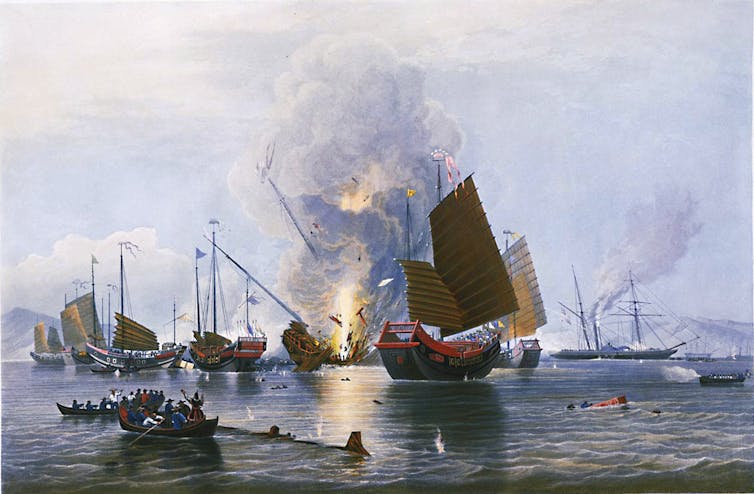By Martin Danahay, Brock University, The Conversation
United States President Donald Trump recently threatened to impose an additional 10 per cent tariff on goods coming from China in response the illegal import into the U.S. of the opioid fentanyl.
Fentanyl has become the latest battleground in an ongoing trade war between the world’s two largest economies. China is currently the primary source of the precursor chemicals needed to manufacture fentanyl.
China and the U.S. have taken steps to tighten the transfer of these chemicals. However, the illegal fentanyl pipeline has switched from direct export into the U.S. to Mexico, where fentanyl is manufactured and then smuggled into the U.S.
While synthetic opioids like fentanyl are a relatively new class of drugs, opium has a long destructive history in trade wars and warfare, beginning with the First Opium War of 1839-42.
The Opium Wars
In the first half of the 19th century, the British government faced an economic problem. Imports of tea, porcelain and silk from China had created a large trade imbalance.
One product that the British could access in large quantities was opium grown in territories under their colonial control.
The British response to address the trade imbalance was to flood the Chinese market with opium. By the 1830s, millions of Chinese citizens were addicted to the drug.
In 1839, in response to the addiction crisis, the Chinese emperor sent an official, Lin Tse-hsu, to Canton (modern-day Guangzhou), the home base for British opium merchants, to stem the flow of opium and destroy the stockpiles of the drug.
The British merchants were outraged by his actions, claimed that the Chinese crackdown contravened the principles of free trade and demanded compensation for the destroyed opium. They successfully lobbied the British government for a military response to the Chinese crackdown.

(Edward Duncan)
The British forces inflicted a series of military defeats on the Chinese until in 1842, when the war was ended with the Treaty of Nanking. The treaty opened five Chinese ports to British traders, imposed heavy reparations for destroyed opium stockpiles and gave the British control over Hong Kong as a permanent base.
Further hostilities broke out in the Second Opium War of 1856-58 when combined British and French forces again inflicted military defeats on China and demanded further concessions on trade.
Opium and opium-based products had an ambiguous status throughout the 19th century. Laudanum, for instance, was a mixture of opium, alcohol and spices and was available as medicine for pain relief and coughs. However, it was also recognized as both potentially addictive and fatal if taken in large amounts. Laudanum bottles contained both recommended dosages (starting at three months old) and a warning that it was poison.
From opium to opioids
Fast forward to today, and opioids still have an ambiguous identity as an analgesic and addictive psychoactive substance. Aggressive marketing by pharmaceutical companies that downplayed or even denied the potential for addiction has created an opioid crisis that has led to millions in the U.S., Canada and elsewhere becoming addicted.
Opioids such as OxyContin were effective in treating pain but have also led to increased problems with addiction. In 2016, synthetic opioids like fentanyl surpassed both opioids and heroin as the leading cause of overdose and deaths.
China was initially reluctant to take measures to help the U.S. deal with its addiction crisis, and the threat of tariffs does not make the Chinese any more likely to want to help. The Opium Wars signalled the start of what is referred to as the “century of humiliation” in China, a period when the country was colonized and dictated to by foreign powers.
Trump’s rhetoric on tariffs is reminiscent of that period, and is unlikely to make the Chinese government more co-operative on drug trafficking and other issues. This approach suggests that nothing has been learned about the importance of international co-operation in tackling crises of addiction since the Opium Wars.
The relationship between China and the West has changed significantly since the days of the Opium Wars, and in many ways the roles are reversed in this current opioid crisis. But rather than threatening a trade war that raises historical memories of previous conflicts, negotiation would work much better.
Former U.S. President Joe Biden’s administration was able to reach an agreement through negotiation that may reduce the amount of fentanyl entering the country. This agreement provides a model on how to use compromise rather than threats to combat the international export of fentanyl.![]()
Martin Danahay, Professor, English Language and Literature, Brock University
This article is republished from The Conversation under a Creative Commons license. Read the original article.






















